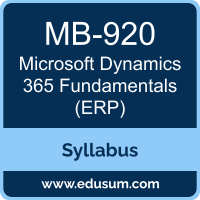 Use this quick start guide to collect all the information about Microsoft Dynamics 365 Fundamentals (ERP) (MB-920) Certification exam. This study guide provides a list of objectives and resources that will help you prepare for items on the MB-920 Microsoft Dynamics 365 Fundamentals (ERP) exam. The Sample Questions will help you identify the type and difficulty level of the questions and the Practice Exams will make you familiar with the format and environment of an exam. You should refer this guide carefully before attempting your actual Microsoft ERP certification exam.
Use this quick start guide to collect all the information about Microsoft Dynamics 365 Fundamentals (ERP) (MB-920) Certification exam. This study guide provides a list of objectives and resources that will help you prepare for items on the MB-920 Microsoft Dynamics 365 Fundamentals (ERP) exam. The Sample Questions will help you identify the type and difficulty level of the questions and the Practice Exams will make you familiar with the format and environment of an exam. You should refer this guide carefully before attempting your actual Microsoft ERP certification exam.
The Microsoft Dynamics 365 Fundamentals (ERP) certification is mainly targeted to those candidates who want to build their career in Microsoft Dynamics 365 domain. The Microsoft Certified - Dynamics 365 Fundamentals (ERP) exam verifies that the candidate possesses the fundamental knowledge and proven skills in the area of Microsoft ERP.
Microsoft Dynamics 365 Fundamentals (ERP) Exam Summary:
| Exam Name | Microsoft Certified - Dynamics 365 Fundamentals (ERP) |
| Exam Code | MB-920 |
| Exam Price | $99 (USD) |
| Duration | 65 mins |
| Number of Questions | 40-60 |
| Passing Score | 700 / 1000 |
| Books / Training | MB-920T00-A: Introduction to Microsoft Dynamics 365 (ERP) |
| Schedule Exam | Pearson VUE |
| Sample Questions | Microsoft Dynamics 365 Fundamentals (ERP) Sample Questions |
| Practice Exam | Microsoft MB-920 Certification Practice Exam |
Microsoft MB-920 Exam Syllabus Topics:
| Topic | Details |
|---|---|
Describe Dynamics 365 Supply Chain Management (35-40%) |
|
| Describe Supply Chain Management core capabilities |
- Describe use cases of Supply Chain Management - Describe products and released products - Describe product master records, product variants, and product dimensions - Describe pricing and discounts in relation to trade agreements - Describe intercompany capabilities |
| Describe the manufacturing process |
- Describe lean, discrete, and process manufacturing - Describe manufacturing strategies - Describe bills of materials (BOMs), formulas, routes, and operations as they relate to production orders - Identify the production lifecycle stages - Describe shop floor management - Describe master planning and planning optimization |
| Describe inventory and warehousing capabilities |
- Describe costing methods - Describe on-hand inventory capabilities - Identify types of inventory journals - Describe quality management capabilities - Describe use cases for Warehouse Management Systems (WMS) - Describe use cases for Transportation Management Systems (TMS) - Describe use cases for landed cost |
| Describe the sales and procurement processes |
- Describe the order-to-cash process - Describe the sales order creation process - Describe the fulfillment process, including inventory reservations and picking and packing - Describe the procure-to-pay process - Describe purchase requisitions - Describe the purchase order creation process - Describe purchase order receipts |
Describe Dynamics 365 Finance (30-35%) |
|
| Describe Finance core capabilities |
- Describe use cases of Finance - Describe organization and legal entities - Describe reporting currency and accounting currency - Describe tax capabilities - Describe cost accounting concepts |
| Describe general ledgers |
- Describe charts of accounts, including main accounts - Describe the concept of a fiscal calendar - Describe financial dimensions and dimension sets concepts - Describe the accounting structure - Describe financial journal concepts - Describe periodic financial processes |
| Describe accounts payables and accounts receivables |
- Describe core accounts payable components, including vendors, purchase orders, and vendor invoices - Describe vendor payments and settlements, including three-way matching concepts - Describe core accounts receivable components, including customers, customer invoices, and free text invoices - Describe credit management processes - Describe the collection process - Describe the concept of subscription billing |
| Describe expense management, fixed asset management, and budgeting |
- Describe cash and bank management concepts - Describe expense management capabilities - Describe fixed asset management capabilities - Describe budgeting capabilities |
Describe the core capabilities of the finance and operations apps (25-30%) |
|
| Describe the finance and operations apps |
- Describe Enterprise Resource Planning (ERP) - Describe the business value of commerce - Describe the business value of Human Resources - Describe the business value of Project Operations - Describe finance and operations apps use cases - Explore the finance and operations user interface |
| Describe reporting and integration capabilities |
- Describe built-in reporting capabilities, including workspaces - Describe options for analyzing data by using Power BI - Describe Microsoft Office 365 integration capabilities, including Microsoft Excel, SharePoint, and Teams - Describe Microsoft Power Platform integration options |
| Describe common features |
- Describe security capabilities - Describe workflow capabilities - Describe the concept of batch jobs |
To ensure success in Microsoft ERP certification exam, we recommend authorized training course, practice test and hands-on experience to prepare for Microsoft Dynamics 365 Fundamentals (ERP) (MB-920) exam.
